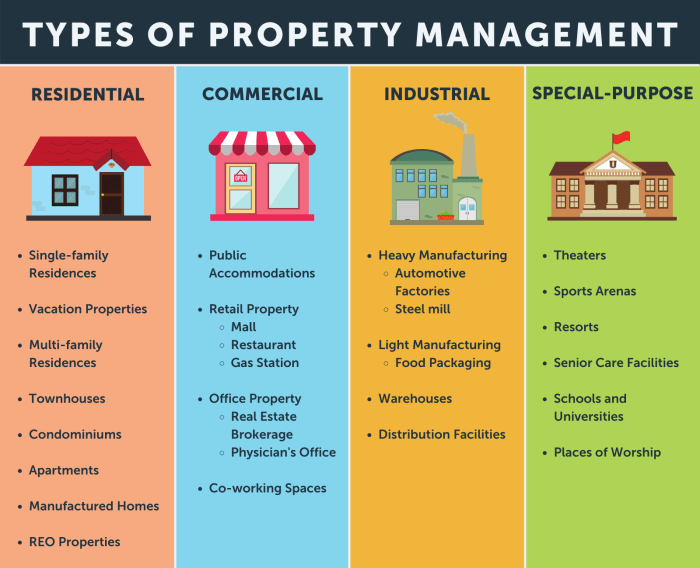Delve into the realm of real estate property management, where the art of overseeing properties is key to success. This guide offers insights into the importance of effective management, the responsibilities of property managers, essential skills required, the impact of technology, and the legal aspects to consider.
The Importance of Real Estate Property Management
Effective property management plays a crucial role in the real estate industry, ensuring that properties are well-maintained, financially viable, and attractive to tenants. Proper management can significantly enhance the overall value of a property and contribute to its long-term success.
Enhancing Property Value and Attracting Tenants
- Regular maintenance and upkeep of the property can help preserve its condition and appeal, ultimately increasing its market value.
- Efficient property management can also involve strategic marketing and tenant screening processes, attracting reliable tenants who can contribute to a positive rental experience.
- Implementing tenant retention strategies, such as addressing concerns promptly and maintaining open communication, can help ensure a stable income stream for property owners.
Challenges Without Efficient Property Management
- Without proper management, properties may suffer from neglect, leading to decreased value and tenant dissatisfaction.
- Inadequate maintenance can result in costly repairs and renovations down the line, impacting the property's profitability.
- Poor tenant management can lead to high turnover rates, vacancy periods, and potential legal issues, affecting the overall financial performance of the property.
Responsibilities of Property Managers

Property managers play a crucial role in overseeing and maintaining real estate properties. They are responsible for various tasks that ensure the smooth operation of the properties they manage.
Common Tasks and Responsibilities
- Collecting rent payments and enforcing lease agreements.
- Handling maintenance and repairs to ensure the property is well-maintained.
- Screening and selecting tenants to fill vacancies.
- Dealing with tenant concerns and issues promptly and effectively.
- Preparing financial reports and budgets for property owners.
Role in Maintaining Properties
Property managers play a vital role in maintaining properties by ensuring that they are well-kept and in good condition. They oversee regular inspections, coordinate repairs and maintenance work, and address any issues that may arise to keep the property in optimal condition for both tenants and property owners.
Interactions with Tenants and Property Owners
- Communicating with tenants to address their needs and concerns, as well as handling complaints in a professional manner.
- Providing property owners with regular updates on the status of their properties, including financial reports and maintenance activities.
- Negotiating lease agreements and handling lease renewals with tenants.
- Facilitating efficient communication between tenants and property owners to ensure a harmonious relationship.
Key Skills for Successful Property Management
Effective property management requires a specific set of skills to ensure the smooth operation and maintenance of real estate assets. Property managers play a crucial role in overseeing properties, interacting with tenants, handling maintenance issues, and ensuring profitability for property owners.
Communication Skills
Effective communication is a cornerstone of successful property management. Property managers must be able to clearly and concisely communicate with tenants, property owners, maintenance staff, and other stakeholders. Strong communication skills help in resolving conflicts, negotiating leases, and addressing concerns in a timely manner.
- Ability to communicate clearly and professionally through written correspondence, phone calls, and in-person interactions.
- Active listening skills to understand tenant needs and concerns, as well as effectively relay information to property owners.
- Negotiation skills to handle lease agreements, rental rates, and conflict resolution between parties.
Problem-Solving Abilities
Property managers often encounter various challenges related to property maintenance, tenant issues, financial management, and legal compliance. Strong problem-solving abilities are essential to address these issues efficiently and effectively
- Quick decision-making skills to resolve maintenance emergencies and tenant complaints promptly.
- Resourcefulness in finding cost-effective solutions for property repairs and maintenance.
- Ability to analyze complex problems and develop strategic plans to overcome obstacles.
Technology in Property Management
Technology has revolutionized the way property management is conducted, offering innovative solutions to streamline processes and improve efficiency in managing real estate properties.
Popular Software and Tools
Property managers utilize a variety of software and tools to effectively oversee real estate properties, some popular options include:
- Property Management Software (PMS): Platforms like Buildium, AppFolio, and Yardi are commonly used for tasks such as rent collection, maintenance tracking, and financial reporting.
- Customer Relationship Management (CRM) Software: Tools like Salesforce and HubSpot help property managers maintain relationships with tenants, vendors, and other stakeholders.
- Smart Home Technology: Devices such as smart locks, thermostats, and security cameras enable remote monitoring and control of properties, enhancing security and convenience for tenants.
Efficiency Improvement through Technology
Technology plays a crucial role in enhancing efficiency in property management, examples include:
- Automated Processes: Software systems automate repetitive tasks like rent collection and lease renewals, reducing manual workload and human error.
- Data Analytics: Tools provide valuable insights on property performance, vacancy rates, and financial trends, enabling informed decision-making for property managers.
- Online Platforms: Listing properties on online rental platforms and using virtual tours facilitate faster tenant acquisition and leasing processes.
Legal Aspects in Property Management
Property managers play a crucial role in ensuring that properties are managed efficiently and in compliance with laws and regulations. Understanding the legal aspects of property management is essential to avoid potential issues and liabilities.
Legal Obligations and Responsibilities
Property managers have various legal obligations and responsibilities, including:
- Ensuring properties comply with building codes and safety regulations.
- Handling security deposits in accordance with state laws.
- Adhering to fair housing laws to prevent discrimination.
- Maintaining accurate records and documentation for each property.
Common Legal Issues
Property managers may encounter several common legal issues, such as:
- Eviction procedures and tenant rights.
- Property maintenance and repair responsibilities.
- Lease agreements and contract disputes.
- Privacy rights and access to the property.
Importance of Compliance
Staying compliant with laws and regulations is crucial in property management to avoid legal consequences. For example, failure to follow eviction procedures properly can lead to lawsuits and financial penalties. Property managers must stay informed about the latest laws and regulations to protect both the property owner and tenants.
Wrap-Up

In conclusion, navigating the world of real estate property management requires a delicate balance of skills, knowledge, and adaptability. By mastering the intricacies of property management, one can unlock the full potential of real estate investments and ensure long-term success in the industry.
FAQ
What are some common challenges in real estate property management?
Common challenges include dealing with difficult tenants, property maintenance issues, and ensuring regulatory compliance.
What are the key skills needed for successful property management?
Essential skills include strong communication, problem-solving abilities, attention to detail, and financial acumen.
How has technology impacted property management practices?
Technology has streamlined processes, improved efficiency, and enhanced communication between property managers, tenants, and owners.